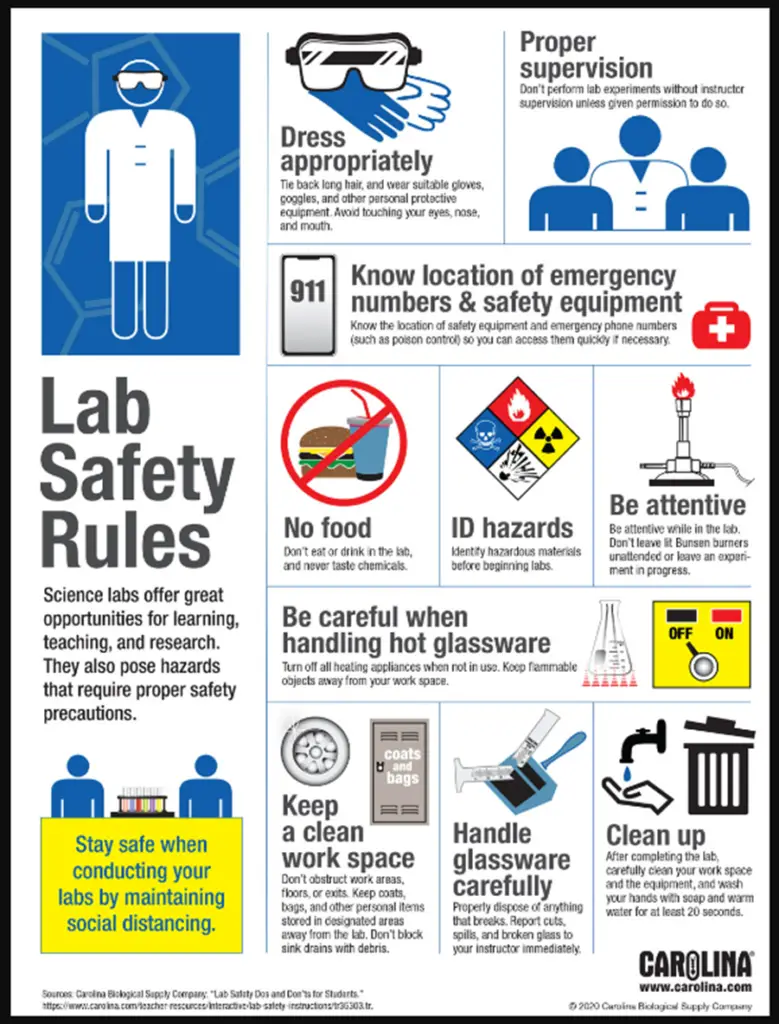Laboratory safety is a critical aspect of scientific research, regardless of the field or discipline. Whether you are conducting experiments in chemistry, biology, physics, or any other scientific area, ensuring the safety of both researchers and the environment should always be a top priority. In this article, iLovePhD will explore the many reasons why laboratory safety is of paramount importance in research.
Critical Importance of Laboratory Safety in Scientific Research
Protecting Human Lives
- The most fundamental reason for prioritizing laboratory safety is the protection of human lives.
- Laboratories often house various hazardous materials and equipment that can pose serious risks to researchers and anyone else in the vicinity.
- Accidents can lead to injuries, illnesses, or even fatalities.
- By implementing proper safety measures, such as wearing personal protective equipment (PPE), maintaining a clean and organized workspace, and following established protocols, researchers can significantly reduce the risk of harm.
Minimizing the Risk of Accidents
- Laboratories are filled with potentially dangerous substances, such as chemicals, biological agents, and radioactive materials.
- Additionally, experiments can involve high temperatures, extreme pressures, and other variables that may cause accidents if not handled correctly.
- Following safety guidelines, using appropriate equipment, and maintaining a cautious attitude can help minimize the risk of accidents, protecting both researchers and the surrounding environment.
Preventing Exposure to Hazardous Substances
- Many research materials used in laboratories can be toxic, carcinogenic, or otherwise harmful if they come into contact with the skin, eyes, or respiratory system.
- Exposure to such substances can lead to acute or chronic health problems.
- Laboratory safety measures, such as proper labeling, storage, and handling of hazardous materials, can help prevent accidental exposure and protect the long-term health of researchers.
Protecting the Environment
- Laboratory research often involves the use of chemicals and materials that can have adverse effects on the environment if not managed responsibly.
- Spills, improper disposal, and inadequate containment can lead to soil and water contamination, air pollution, and other ecological issues.
- Following strict laboratory safety procedures ensures that research activities do not harm the environment and contribute to sustainable scientific practices.

Maintaining Research Integrity
- Laboratory safety is also closely tied to research integrity.
- Inaccurate or compromised results can occur when safety is overlooked or shortcuts are taken.
- Contamination, equipment failures, or accidents can disrupt experiments, rendering data unreliable.
- Ensuring laboratory safety promotes the credibility and validity of research findings, which is essential for the advancement of science.
Legal and Ethical Obligations
- In many countries, there are legal and ethical obligations surrounding laboratory safety.
- Researchers and institutions may be subject to regulations, codes of conduct, and safety standards that must be adhered to.
- Non-compliance can result in legal consequences, financial penalties, or even the suspension of research activities.
- Upholding these obligations is not only a legal requirement but also a moral responsibility.
Promoting a Culture of Responsibility
- Fostering a culture of responsibility and safety within the research community is vital.
- Encouraging researchers to prioritize safety in their work creates a collaborative and supportive environment where everyone is vigilant about potential hazards.
- It also helps to learn good safety habits early in the careers of aspiring scientists, ensuring that safety remains a core value in future research endeavors.
Emergency Preparedness
- In case of an emergency, the researcher should be well aware of the emergency response protocols.
- The laboratory personnel should provide basic information about emergencies to the researchers.
- The researcher should be well aware of the contact numbers for different kinds of emergencies.
- There might be an accidental spill or release of hazardous material that can produce a risk to people in the laboratory, work surface, and the environment.
- The researcher should know how to handle any accidental spills.
- Immediate spill response is the responsibility of the person who caused spill.
- He/she must wear the necessary protective clothing to handle the spill.
- If any clothing becomes contaminated with the spill, they must promptly remove it.
- If the spill comes into contact with the skin, wash the affected area with water.
- The researcher should possess knowledge about the location and proper utilization of the spill control kit, and they must use it.
There can be many specific regulations regarding the use of each equipment and chemical the researcher should be well aware of all those regulations.
Conclusion
In the world of scientific research, laboratory safety is not an option but a necessity. Protecting human lives, preventing accidents, minimizing exposure to hazardous materials, safeguarding the environment, and maintaining research integrity are all crucial reasons why laboratory safety should be a top priority for every researcher and institution. The scientific community can ensure that research is conducted responsibly and ethically, leading to valuable discoveries that benefit society while minimizing risks and harm by prioritizing safety.
References
- “Laboratory Safety”, Environmental Health Safety. Princeton Univ.
- “Chapter 9: Laboratory Safety in Research”, On Being a Scientist: A Guide to Responsible Conduct in Research. (2009). 3rd Ed.